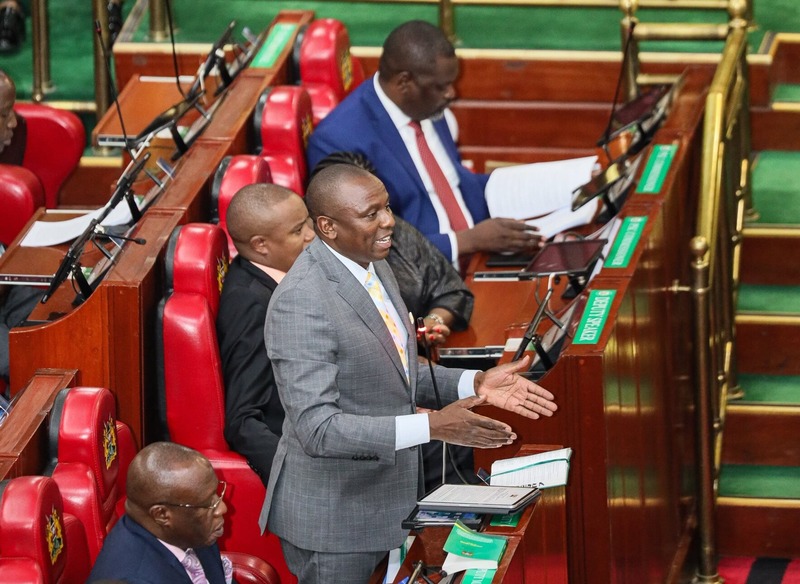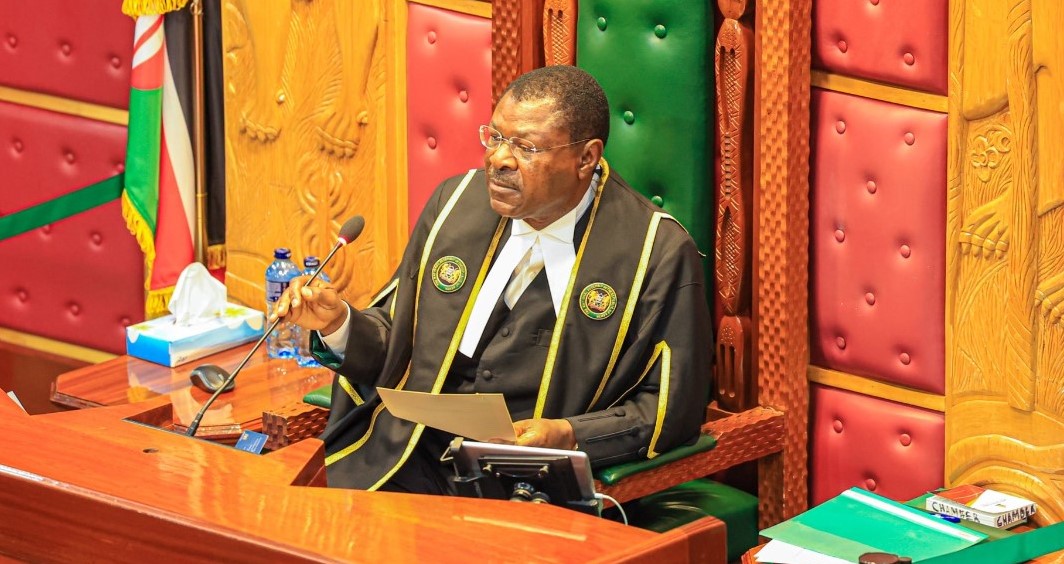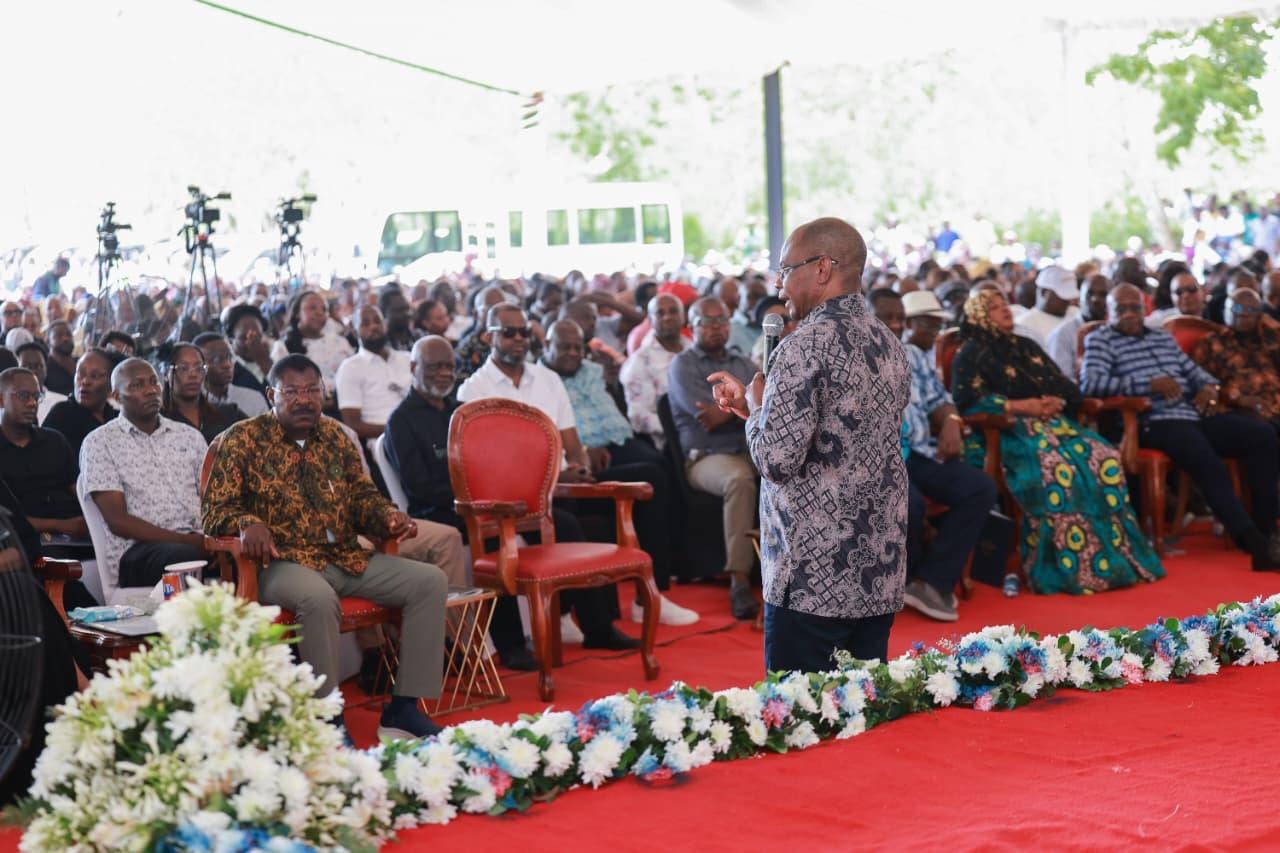Kenya Kwanza MPs reject court ruling on majority status, warn of parliamentary crisis

The lawmakers argue that the ruling is impractical given the fluid nature of political alliances and should be addressed within Parliament.
Legislators allied to Kenya Kwanza have rejected a court decision that nullified the coalition’s majority status, insisting that parliamentary affairs should not be dictated by judicial rulings.
The lawmakers argue that the ruling is impractical given the fluid nature of political alliances and should be addressed within Parliament.
More To Read
- Speaker Wetang’ula loses appeal as court upholds Azimio’s majority status
- Here's the 10-point deal in the Ruto-Raila MoU
- Kenya Kwanza-ODM agreement is not a coalition, says National Assembly Minority Whip Osoro
- High Court declares Azimio National Assembly Majority party, overturns Speaker’s decision
- State gives extra Sh18 billion for permanent hiring of all 46,000 JSS intern teachers
- OPINION: Mr President, please be considerate and fair as you move to levy new taxes
Speaking during an interview with Citizen TV on Monday, Ugenya MP David Ochieng dismissed the ruling as unworkable, saying that political affiliations have shifted since the 2022 General Election, and Parliament should be the ultimate authority in resolving the matter.
“I don’t want this to be an issue that depends on what the judges say. This should be left to Parliament to decide because that is how Parliament works,” Ochieng said.
He further questioned the practicality of implementing the decision, adding, “This decision, how is it possible to implement it now?”
Laikipia Woman Representative Jane Kagiri also criticised the ruling, pointing out that many parties initially under the Raila Odinga-led Azimio la Umoja coalition have since aligned with Kenya Kwanza. She argued that some of these parties had joined Azimio under pressure and later opted to leave.
“The ruling has been overtaken by events because many of these parties have left, and I remember most of them raised issues of coercion for them to have remained under Azimio at the time,” she said.
Eldas MP Adan Keynan termed the judgment a political manoeuvre meant to undermine the ruling coalition, maintaining that the initial declaration of Kenya Kwanza as the majority was based on a legitimate realignment of political allegiances before the election of National Assembly Speaker Moses Wetang’ula.
“That judgment attempts to micromanage Parliament; it attempts to deal with political issues that ideally should be left to politicians. This ruling has no effect in law,” Keynan said.
The lawmakers were responding to a ruling issued on Friday by a three-judge High Court bench, which declared that President William Ruto’s Kenya Kwanza does not hold the majority status in the National Assembly.
Justices John Chigiti, Lawrence Mugambi, and Jairus Ngaah also ruled that Speaker Wetang’ula’s continued leadership of Ford Kenya is unconstitutional, stating that he should have relinquished his position as party leader upon assuming the Speaker role.
 National Assembly Speaker Moses Wetang’ula. (Photo: National Assembly)
National Assembly Speaker Moses Wetang’ula. (Photo: National Assembly)
“The dual role is unlawful and unconstitutional. Once he became Speaker of the National Assembly, he ceased to be the leader of Ford Kenya party,” the judges ruled.
No legal basis
The court’s decision arose from Wetang’ula’s declaration on October 6, 2022, which reassigned 14 members from various parties to Kenya Kwanza, tipping the balance in favour of the coalition and allowing it to claim majority status. However, the judges found that the Speaker had no legal basis for making the reassignments and nullified his decision.
In response, Wetang’ula downplayed the ruling, asserting that the court did not direct him to step down as Speaker or relinquish his party leadership.
He described the ruling as “ordinary comments” in law, arguing that they are non-binding and have no legal consequence.
The High Court’s decision is expected to have far-reaching implications on the conduct of government business in the National Assembly unless the Court of Appeal grants a stay of execution.
Despite delivering its verdict, the court did not specify a timeline for compliance, though legal experts Charles Kanjama and David Ochami indicated that the ruling would take effect immediately. The National Assembly had requested a 45-day stay, which was declined.
“There will be several changes unless the Speaker gets orders at the Court of Appeal,” Senior Counsel Kanjama said.
“The Leader of Majority normally moves government business in the House, and this may become unworkable with the court judgment.”
Budget Policy Statement
One of the most pressing issues facing the House as it resumes sittings after the Christmas recess is the Budget Policy Statement (BPS), which the National Treasury is expected to present by February 14.
The Public Finance Management (PFM) Act mandates that the BPS be submitted by February 15 each year, but since the date falls on a Friday when the House does not sit, it is scheduled for submission a day earlier. The Leader of the Majority is responsible for relaying the document to Parliament, but with the uncertainty surrounding Kenya Kwanza’s majority status, questions have emerged over who will undertake this role.
Under Kenya’s pure presidential system, Parliament is expected to function as an independent entity that provides oversight over the Executive and Judiciary. However, political alignments have often influenced parliamentary operations, raising concerns about how the new ruling will affect the government’s legislative agenda.
Legal experts argue that the ruling does not alter the numerical strength of President Ruto’s United Democratic Alliance (UDA) in Parliament but instead shifts control of House committees to Azimio la Umoja. Despite the judgment, MPs who initially aligned with Azimio but later shifted allegiance to Kenya Kwanza are unlikely to change their loyalty.
“It means that the departmental committee chairs would be assigned to the Azimio coalition, including the majorities in the committees,” Kanjama said.
The development could complicate Kenya Kwanza’s ability to push its legislative agenda, especially in instances where government-backed bills require committee approval. Additionally, it could expose divisions within the ruling coalition, particularly in efforts to purge members deemed disloyal.
A major point of contention is the fate of committee chairs perceived to be sympathetic to former Deputy President Rigathi Gachagua. The National Assembly’s Standing Order 172 (1) establishes the Committee on Selection, chaired by the Leader of Majority, to determine committee memberships. However, with the legitimacy of Kenya Kwanza’s leadership in question, the committee’s ability to function effectively remains uncertain.
The situation has raised concerns about planned changes in House leadership, with some Kenya Kwanza MPs allegedly targeted for removal from key positions. Among those reportedly on the chopping block is Kiharu MP Ndindi Nyoro, chairperson of the Budget and Appropriations Committee (BAC), who skipped the House sitting on October 8, 2024, during the impeachment vote against Gachagua.
With Kenya Kwanza leaders insisting that the ruling has no legal effect while Azimio pushes for its enforcement, the political standoff in Parliament is set to intensify. The focus now shifts to the Court of Appeal, where the Speaker and Kenya Kwanza hope to secure a stay of execution and maintain control over the House.
Top Stories Today
















































